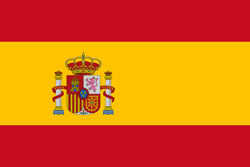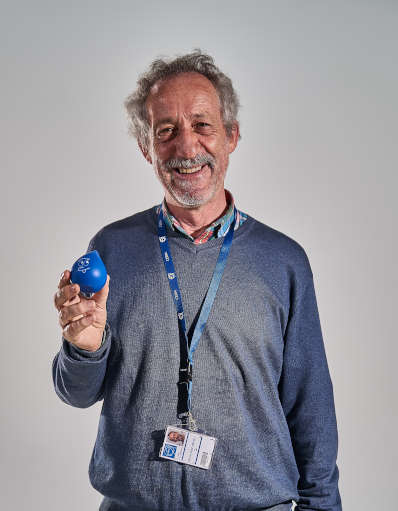IPPOG
IPPOG Forum Members
Spain

Intro
The Spanish particle physics community invests a sizable effort in science outreach and promotion. Most research institutions and universities in this field carry out numerous activities, both at local level and national level. The coordination of national activities is a responsibility of the National Center for Particle, Astroparticle and Nuclear Physics (CPAN) which centralizes and manages outreach initiatives.
Both from CPAN and from the centers themselves, there is a steady participation in all the important European events and activities such as the Science Week, the European Night of Researchers, and various IPPOG masterclasses, as well as other initiatives such as "The CPAN in High Schools” a series of seminars in high schools from which thousands of students throughout Spain benefit every year.
Details
La comunidad española de física de partículas dedica un considerable esfuerzo a la promoción y divulgación de la ciencia. Las numerosas instituciones investigadoras y universidades con actividad en dicho campo realizan numerosas actividades, tanto a nivel local como de forma coordinada a nivel nacional.
Dicha coordinación recae en el Centro Nacional de Física de Partículas, Astropartículas y Nuclear (CPAN) que centraliza y gestiona las iniciativas de divulgación. Tanto desde el CPAN como de los propios centros se participa habitualmente en todos los eventos y actividades europeas más importante como la Semana de la Ciencia, la Noche Europea de los investigadores, y diversas masterclasses IPPOG, así como otras iniciativas propias como “El CPAN en el Instituto” un ciclo de seminarios en institutos de secundaria del que cada año se benefician miles de estudiantes en toda España.
JOINED: 2016
CURRENT STATUS: MEMBER
Representative

Former Head, High Energy Physics Grou
Instituto de Fisica de Cantabria (CSIC-Univ. de Cantabria), C/Avda. los Castros, s/n, 39005 Santander, Spain
ruiz@ifca.unican.es
Alberto Ruiz Jimeno
Following earning his PhD from Cantabria University (UC) Alberto was appointed first as associate professor and then, since 1991, as full Professor of Atomic, Molecular and Nuclear Physics, specialized in experimental particle physics, of the Cantabria Institute of Physics (IFCA, CSIC-Univ. Cantabria). He has been Director of the First Doctoral School in Spain, and Vicerrector for Doctoral Studies and Institutional Relations at the University of Cantabria. He has been President of the Cantabria Local Section of the Spanish Physics Royal Society and actually is the Coordinator of the National Thematic Network for Future Linear Colliders and Spanish delegate to IPPOG. He has been involved in several experiments and scientific policy committees. His research has been linked to heavy flavor and tau lepton physics and Higgs searches at LEP, Tevatron and LHC, as well as R&D for future linear colliders. In 2007 he was awarded the Research Prize of the Social Council of the Cantabria University as coordinator of the IFCA group on Bs oscillations at the CDF experiment. In 2016 he was elected by the CSIC and the outreach magazine QUO as a member of the Spanish selection of science. He has also been chairman of several International workshops on High Energy Physics.
Alberto has participated in several educational projects for scholars organized by IFCA and other institutions, and has been the organizer of the International Masterclasses in Spain since 2005. “It is very stimulating to see young people become involved in fundamental physics. We are proud to have helped them choose their career; some of them are already involved in science and Masterclasses has contributed to their decision to pursue studies in physics.”
Tras doctorarse en la Universidad de Cantabria (UC), Alberto fue nombrado primero profesor titular y luego, desde 1991, catedrático de Física Atómica, Molecular y Nuclear, especializado en física experimental de partículas, del Instituto de Física de Cantabria (IFCA, CSIC-Univ. Cantabria). Ha sido director de la Primera Escuela de Doctorado de España, y Vicerrector de Estudios de Doctorado y Relaciones Institucionales de la Universidad de Cantabria. Ha sido presidente de la Sección Local de Cantabria de la Real Sociedad Española de Física y es, actualmente, Coordinador de la Red Temática Nacional de Futuros Colisionadores y delegado español en el IPPOG. Ha participado en varios experimentos y comités de política científica. Su investigación ha estado vinculada a la física del sabor pesado y del leptón tau y a las búsquedas de Higgs en el LEP, el Tevatrón y el LHC, así como a la I+D de los futuros colisionadores lineales. En 2007 recibió el Premio de Investigación del Consejo Social de la Universidad de Cantabria como coordinador del grupo del IFCA sobre oscilaciones Bs en el experimento CDF. En 2016 fue seleccionado por el CSIC y la revista de divulgación QUO como miembro de la Selección Española de la Ciencia. También ha sido presidente de varios congresos internacionales sobre Física de Altas Energías.
Alberto ha participado en varios proyectos educativos, para estudiantes de secundaria, del IFCA y otras instituciones, y ha sido el organizador de las Clases Magistrales Internacionales en España desde 2005. "Es muy estimulante ver cómo los jóvenes se involucran en la física fundamental. Estamos orgullosos de haberles ayudado a elegir su carrera; algunos de ellos ya se dedican a la ciencia y las "Masterclasses" han contribuido a que se decidan a cursar estudios de física.

